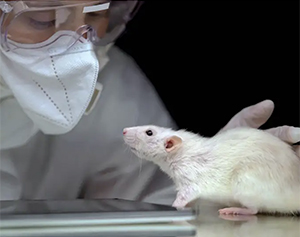A major success in the USA: animal testing no longer required in drug development
New law allows non-animal testing
For the first time in more than 80 years, a change in U.S. law allows the animal-free testing of new drugs using modern, human-based methods. The Irish Anti-Vivisection Society is pleased with this huge step forward and calls for Ireland and the EU to use this as an example by developing and implementing a strategy for human-relevant drug development without animal testing.
The new law, signed by U.S. President Joe Biden at the end of December 2022, allows the U.S. Food and Drug Administration (FDA) to approve new drugs without demanding data from animal testing. Previously, pharmaceutical companies were required by law to test the safety and efficacy of their drug candidates in multiple animal trials using at least two species before they were allowed to test the drug candidates in clinical trials with human subjects and patients. "A large amount of data clearly exposes the failure of the outdated system based on animal testing. On average, 95% of drug candidates that successfully pass all animal tests are later abandoned during human clinical trials, mainly because they do not work or cause significant side effects," says Dr. Dilyana Filipova, a scientist at the German group Doctors Against Animal Experiments, a partner of the IAVS in the European Coalition to End Animal Experiments (ECEAE).
Thanks to the new law, modern, human-relevant methods, such as human mini-organs ("organoids"), organ-on-chips and computer-based methods can now be used for regulatory purposes in the U.S. in place of standard animal testing. Many non-animal methods have already proven to be more accurate and reliable than animal testing. For example, a recent study demonstrated the toxicity of several liver-damaging compounds using human liver-chips, whereas previous animal experiments had incorrectly classified the same compounds as harmless. "Such examples show the potential of this legislative change to not only save countless animals from gruesome testing and a cruel death, but also to ensure better safety for patients," Filipova said.
Animal testing, however, is not banned under the new law and remains allowed as a possible testing system. Nevertheless, it is a huge step forward that pharmaceutical companies will no longer be required by law to conduct these animal tests and will have the freedom to rely on precise, human-relevant, animal-free methods.
While the U.S. is introducing this modern, forward-looking legislation, some animal testing in the EU, and thus also in Ireland, is still required by law for drug approval. The IAVS joins with its colleagues in the ECEAE to call on the EU Commission to immediately establish and implement a phase-out strategy away from the flawed animal testing system. "Europe must take the U.S. as a role model as soon as possible and no longer require animal testing for drug testing. If we want to develop better therapies and not fall behind in the global drug market, we should also rely on the most modern, successful and reliable human-based methods and not on pointless animal testing," says Filipova.
More information and sources
World Animal Foundation - Animal Testing Statistics – Exposing Cruelty in the Name of Science!
Wadman M.: FDA no longer needs to require animal tests before human drug trials. Science 2023; doi: 10.1126/science.adg6264
H.R.2617 - Consolidated Appropriations Act, 2023. Sec. 3209. Animal Testing Alternatives.
Ewart L et al. Qualifying a human Liver-Chip for predictive toxicology: Performance assessment and economic implications. bioRxiv 2021; doi: 10.1101/2021.12.14.472674:2021.12.14.472674


